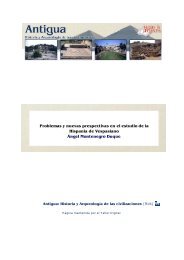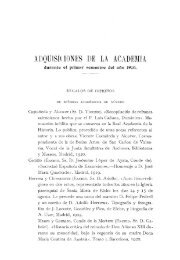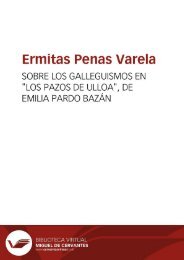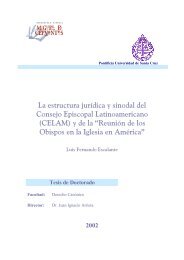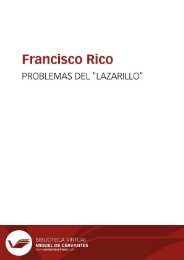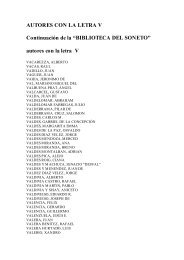Create successful ePaper yourself
Turn your PDF publications into a flip-book with our unique Google optimized e-Paper software.
Anales galdosianos [Publicaciones periódicas]. Año XII, 1977<br />
Le Bon's comments on the jury succinctly states the same notion: « Et c'est ainsi qu'on voit des jurys<br />
rendré des verdicts que désapprouverait chaque juré individuellement... ». 13<br />
Judging by the above, we note that <strong>Galdós</strong> recognized a phenomenon the psychological implications<br />
of which are utilized today by television producers. Laughter, as well as fear, is highly infectious.<br />
As a result, it has been observed that a member of a motion picture audience laughs more readily at<br />
humorous events than the solitary television viewer of the identical film. Horror movies are probably<br />
more effective with respect to audiences in movie theaters than to the individual home viewer. In<br />
order to simulate to some degree the impact of the group upon the individual, producers of many<br />
television comedy series employ pre-recorded laughter on the soundtrack of their program. This<br />
«canned-laughter», operating in much the same manner as would laughter emanating from a theater<br />
audience, provokes the viewer to laugh and produces the illusion of greater comicity than might<br />
actually exist. The pre-recorded laughter of the soundtrack indeed causes the viewer to temporarily<br />
relinquish his individuality while becoming one cell, so to speak, in an artificial group-organism. The<br />
individual's personality is subordinated to that ephemeral organism (an «audience» represented by its<br />
voice alone) in much the same manner as suggested by <strong>Galdós</strong> who states that the « opinión » of «<br />
un público » is not equal to the sum of the opinions held by its components.<br />
Another facet of the relationship between the individual and the group-organism is revealed in the<br />
course of Lázaro's unsuccessful speech at the Fontana de Oro. The omniscient narrator explains: «<br />
En todo orador hay dos entidades: el orador, propiamente dicho, y el hombre. Cuando el primero se<br />
dirige a la multitud, el segundo queda atrás, dentro, mejor dicho, hablando también » (p. 55). In this<br />
dédoublement , the independent personality (« el hombre ») remains in the background or rather<br />
within, which is equivalent to its being submerged, and observes its own actions (oratory, in the case<br />
at hand) with detachment. Lázaro as « orador, propiamente dicho », functions as one cell of a group-<br />
organism while his independent personality (« el hombre ») is temporarily suspended.<br />
At this point in <strong>Galdós</strong>' development of the scene, Lázaro has not yet been definitively absorbed by<br />
the group-organism; he is attempting to be absorbed by it. His efforts to sway the audience may be<br />
compared vaguely to the manner in which an idea occurs in the human mind. The audience considers<br />
Lázaro's words much as a mind weighs ideas. Just as the mind ultimately either accepts and then acts<br />
upon an idea or, on the contrary, rejects it after consideration, the gathering at the café, after having<br />
13 Ibid. , p. 15.<br />
13




